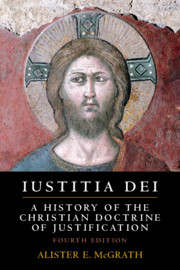Book contents
- Iustitia Dei
- Iustitia Dei
- Copyright page
- Contents
- Tables
- Preface to the Fourth Edition
- Abbreviations
- Introduction
- Part I Justification
- Part II The Middle Ages
- Part III Protestantism
- Part IV Catholicism
- 20 Developments within Catholicism, 1490–1545
- 21 Catholic Responses to Early Protestant Doctrines of Justification
- 22 An Attempt at Rapprochement
- 23 Catholic Theological Schools during the Tridentine Debates on Justification
- 24 The Tridentine Debates on Justification
- 25 The Tridentine Decree on Justification
- 26 Post-Tridentine Discussions of Justification
- Part V The Modern Period
- Conclusion
- A Brief Glossary of Medieval Soteriological Terms
- Works Consulted
- Index
26 - Post-Tridentine Discussions of Justification
from Part IV - Catholicism
Published online by Cambridge University Press: 27 January 2020
- Iustitia Dei
- Iustitia Dei
- Copyright page
- Contents
- Tables
- Preface to the Fourth Edition
- Abbreviations
- Introduction
- Part I Justification
- Part II The Middle Ages
- Part III Protestantism
- Part IV Catholicism
- 20 Developments within Catholicism, 1490–1545
- 21 Catholic Responses to Early Protestant Doctrines of Justification
- 22 An Attempt at Rapprochement
- 23 Catholic Theological Schools during the Tridentine Debates on Justification
- 24 The Tridentine Debates on Justification
- 25 The Tridentine Decree on Justification
- 26 Post-Tridentine Discussions of Justification
- Part V The Modern Period
- Conclusion
- A Brief Glossary of Medieval Soteriological Terms
- Works Consulted
- Index
Summary
Chapter 26 considers how the Council of Trent’s Decree on Justification was received within Catholicism, particularly during the second half of the sixteenth century. The chapter contains two main blocks of material. First, it considers early Catholic Interpretations of the Decree, noting how the Decree was open to several interpretations at points. The most interesting of these concerns whether the Decree permitted the teaching that justification could be merited de congruo, an opinion which was widely held within Franciscan theological circles. The Council of Trent also gave rise to a series of Catholic catechisms, designed to blunt the Protestant advantage in this field. The Catechismus Romanus and Peter Canisius’s Summa doctrinae christianae (1555) are of particular importance. The chapter also notes how the Council of Trent’s decree on justification initially led to Catholic discussion of salvation focussing on the concept of justification. However, a gradual return to the more traditional Catholic use of multiple images of salvation, including but not restricted to justification, can be seen taking place in the seventeenth century.
Keywords
- Type
- Chapter
- Information
- Iustitia DeiA History of the Christian Doctrine of Justification, pp. 333 - 340Publisher: Cambridge University PressPrint publication year: 2020



